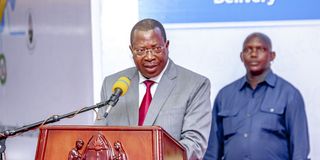Vice President Mpango reveals why he decided against standing as Samia's running mate

What you need to know:
- Dr Mpango, 68, reflected on his extensive career in public service and acknowledged the growing number of young Tanzanians who have the potential to contribute significantly to national leadership.
Arusha. Vice President Philip Mpango has opened up about his decision to step down as President Samia Suluhu Hassan’s running mate in the next elections, citing his long service to the nation and the need to allow younger leaders to step forward.
Dr Mpango, 68, reflected on his extensive career in public service and acknowledged the growing number of young Tanzanians who have the potential to contribute significantly to national leadership.
He made the remarks on Tuesday February 11, 2025, while officiating the opening of the three-day e-Government Annual Conference, which has brought together over 1,300 ICT professionals from various sectors.
Dr Mpango outlined his long service record, which includes 14 years as a university lecturer, five years at the World Bank, a role under former President Jakaya Kikwete at State House, service as Deputy Permanent Secretary at the Treasury, six years as Permanent Secretary for Planning, leadership at the Tanzania Revenue Authority (TRA), and over five years as Minister for Finance. Most recently, he has served as Vice President for four years.
However, President Hassan revealed during a special general meeting of the ruling Chama cha Mapinduzi (CCM) which appointed her as the 2025 presidential candidate, that Dr Mpango had requested to rest in the upcoming polls.
"I believe it is time. One of the things that has weighed on me throughout my career, as I have briefly outlined, is that not many Tanzanians have had the opportunity to serve in such crucial position as I have. That is why I have decided to step aside and allow others to take up the mantle," he said.
Citing the 2022 national population census, Dr Mpango noted that approximately 77 percent of Tanzanians are young. He believes the best way he can support their progress is by creating space for them to lead.
"With Tanzania’s population approaching 64 million, and the majority being young people who are achieving great things, I am confident that capable young Tanzanians are ready to take on the responsibility of assisting the President," he added.
Cybersecurity
Speaking at the meeting, Dr Mpango urged heads of public institutions to strengthen security measures to protect digital systems and combat cybercrime.
"The e-Government Agency must collaborate with the Tanzania Communications Regulatory Authority (TCRA) and security agencies to safeguard our digital systems and curb cybercrime. This is particularly crucial now that the government is emphasising system interoperability to enhance information sharing," he said.
Additionally, he instructed all public institution leaders to adhere to laws, regulations, and guidelines governing e-government implementation.
Dr Mpango also directed the permanent secretary of the responsible ministry to strengthen the national technology research centre, aiming to enhance innovation and efficiency in public service delivery.
While welcoming the guest of honour, the Minister of State in the President’s Office for Public Service Management and Good Governance, Mr George Simbachawene, emphasised the government’s commitment to improving technology systems. He noted that the goal is to integrate all public institutions to reduce costs and service delivery times.
"We aim to ensure that all regional and district administrative meetings are conducted digitally rather than in person using paper. This will improve efficiency, transparency, and accountability," he said.
However, Mr Simbachawene acknowledged existing challenges, including the lack of a unified national identification system from birth and the limited expansion of ICT infrastructure across the country.
The director general of the e-Government Agency, Mr Benedict Ndomba, reported that efforts to improve ICT systems are ongoing, facilitating more efficient public service delivery.
"Since the establishment of e-government initiatives, significant progress has been made, including the use of digital platforms to enhance operations in government institutions."
"To align with global technological advancements, we have established an Internet Research and Innovation Development Centre. This centre focuses on research and system innovations to address national challenges and improve government operations," Mr Ndomba explained.
The chairperson of the Parliamentary Standing Committee on Governance, Constitution, and Legal Affairs, Mr Joseph Mhagama, highlighted that the Parliament is one of the institutions benefiting from ICT innovations. He urged the government to continue developing more digital solutions to enhance service accessibility for citizens.
"However, a major challenge remains the lack of ICT infrastructure in rural and remote communities, where residents must still input their details into systems to access government services. The government must accelerate efforts to expand this infrastructure," he said.




